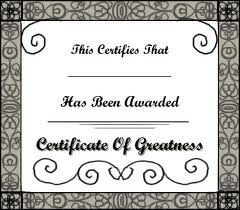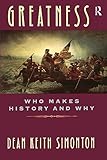What is Greatness? (And Can I Achieve It?)

A Song About One Definition of Greatness
Is "Greatness" Worth It?
I know it sounds arrogant, but there have been moments in my life which revealed potential greatness. Sometimes it has happened when playing sports. There have been days where I hit ten jump shots in a row, bowled a 245 game, hit a series of ridiculous shots in racquetball, or almost beat a former nationally ranked player in ping pong. Of course, there was always something holding me back. In basketball, I had the distinct disadvantage of being short and white. With racquetball, I did not start playing consistently until I was too old. And for all of these sports, I never devoted the necessary time and energy to any one sport to go from good to really good to great. It was more fun, after all, to be a “renaissance man” of athletics.
Sometimes I wonder if the same thing is true for both my academic and teaching career. As a college student, I had occasional moments of greatness. I remember missing one question on a 100 question Geography test, and the instructor announced how much this “pissed him off” when passing back the tests. Another instructor asked me to speak to him after class, making me wonder, of course, what I could have possibly done wrong. He then asked me if I had written the summary of The Autobiography of Malcolm X that he had just graded. When I assured him that I had written it, he wrote an A+ on it and said that it was one of the best papers that he had ever received. When I took the GRE test in an attempt to get in to a PHD program in History, I scored in the 97th percentile on one of the sections. (Not bad for a Cal State student.) Of course, having said all of this, I am now “just” an adjunct instructor with a lowly Master’s Degree. Am I another of those people we always hear about who has not lived up to his potential?
In teaching, I sometimes get that same feeling. From almost the first day that I stood up in front of a classroom when I was student teaching, it was clear that teaching - at least the presentation part - came pretty naturally to me. I was always a quiet kid growing up, and I was amazed at how easy public speaking was for me. (Discipline and classroom management were completely different stories, however.) In community college, where I was freed up, pretty much, from worrying about discipline, things came even more easily. I have never written out my lectures; I always work off of a general outline. The lectures are never exactly the same, and I am able without even planning to pull in things I may have heard on the radio on the drive to class. A fair amount of what I do, in fact, is improvised, as I often “riff” for a while and then come back to the basic outline. I have also developed something of a comedy routine over the years, and the most common positive statement I get on rateyourprofessor.com is “he’s funny.” (I even get this sometimes from people who mostly complain about me.)
And yet, here I am, “just” an adjunct instructor scraping a living by teaching a class or two at several different schools. No distinguished awards. Nothing published. Not even a consistent income. So what’s my excuse this time? Don’t worry; I have several. The simplest excuse is that I am not as talented as I would like to think. This is the easiest way to live with myself. It’s not my fault, after all, if I was not born with the potential to be great. Of course, the opposite may also be true, and I am actually “cursed” by my “talent.” Because things come relatively easily, I have never been required to push myself too hard.
Another problem / excuse has to do with the system in which I work. It makes economic sense, particularly in these difficult budget times, for California community colleges to hire part-timers. Full-time jobs rarely come up, and when they come up within the vicinity of where I live, there are huge numbers of applicants. Even if I were the greatest teacher in the world – which I do not claim to be, by the way – full-time jobs simply do not exist. And how would anyone know how good I am anyway? The only time anyone other than students sees me is during occasional faculty evaluations in which another teacher sits in on my class for about 20 minutes. Now don’t get me wrong; I like the autonomy that schools give me, but it does not provide me with many opportunities to show off my skills. So I am forced to work part-time, which is actually a misnomer. To make an adequate income, I actually teach more classes than full-time teachers, and when you teach six or seven classes at four different schools, it limits the amount of time you can spend on historical scholarship.
OK, those are decent excuses, but there are some questions that have not been addressed. Why not expand the range of my job search and move to where the jobs are? Why don’t I go back to school and get a PHD or a second Master’s Degree in order to improve my marketability? Maybe this could lead to publishing or some sort of research to further distinguish myself. These questions run through my head all of the time. They are part of the reason that I have embarked on this whole writing exercise in the first place.
What would it take to achieve the things that are often defined as “greatness” in society? How do people become distinguished experts giving lectures, writing books, and sharing their opinions on NPR talk shows? What kind of people become political leaders, great athletes, and academic elites? I don’t think that you can give simple, comprehensive answers to any of these questions. One story, I think, that most people are familiar with is the story of the miserable famous person. This is the person with the messed up family life, a small number of real friends, and serious health problems that often develop at some point in his or her life. When you ask people what is most important in life, whether they are one of these famous people or not, they will often give the stereotypical answers: family, friends, God, health, etc. But when you look at how people spend their time, it is clear that sentiment does not always match reality. In many cases, this is particularly true with people at the top of their fields. To get to the top, career has to be the primary focus. Now there may be exceptional people who are so talented that they are able to reach the top without neglecting all of the other aspects of their lives. There may be hard working people who somehow find the proper balance. I tend to think, however, that these people are the exception rather than the rule.
I don’t want to be one of those people who looks back and realizes all of the things that he missed out on while he was busy trying to be “great.” Yes, I want to become a better teacher and scholar of history than I am today. But I also want to be a good father, husband, brother, and son who lives close to his family even though it may limit job prospects; a better racquetball player who keeps himself in good physical condition; and a person who has time to enjoy some of the wide variety of things that life has to offer. And if this means that my career gets “neglected” and the only acclaim that I get comes from students (and there have been many) who tell me how much they enjoyed my class, then so be it!
It is a constant struggle to find the right balance between work and all of the other things that I want to do, and there are times where I would love to run off to the woods and do nothing but read and write for a week. It is impossible, however, to find that perfect balance, so if I have to choose between erring on the side of either working too much or too little, I will choose too little, and I will consider my life to be a success. In my mind, many people have a tendency to define success in a very narrow way, and I’m not just making excuses.










